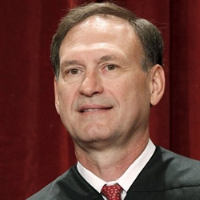Some Supreme Court Justices Don’t Bother to Fact-Check “Facts” They Cite
 Justice Samuel Alito
Justice Samuel Alito
The introduction of facts in the courtroom is supposed to occur at the trial court level, not once cases reach the appellate level. But that hasn’t stopped the U.S. Supreme Court, the highest court in the land, from considering new information provided in amicus briefs, regardless of whether the information is actually true or accurate.
The New York Times found some justices had cited “facts” in their decisions from questionable sources.
Justice Stephen Breyer mentioned last year as part of a case on copyright infringement that U.S. libraries hold 200 million books published overseas. “The figure in the brief came from a blog post,” the newspaper’s Adam Liptak reported. “The blog has been discontinued.”
Justice Samuel Alito claimed during the Hobby Lobby case that the court did not use facts cited in amicus briefs. But in a 2011 decision, Alito wrote that 88% of businesses perform background checks on employees. He got the figure from an amicus brief that didn’t cite the source of this information.
Justice Antonin Scalia has taken his colleagues to task for pulling facts from amicus briefs. In a 2011 dissent, he wrote: “Supreme Court briefs are an inappropriate place to develop the key facts in a case. An adversarial process in the trial courts can identify flaws in the methodology of the studies that the parties put forward; here, we accept the studies’ findings on faith, without examining their methodology at all.”
Allison Orr Larsen, a law professor at the College of William and Mary, was quoted in an article to be published in The Virginia Law Review as saying: “The court is inundated with 11th-hour, untested, advocacy-motivated claims of factual expertise.” Larsen found the court had cited facts contained in amicus briefs 124 times from 2008 to 2013. In 61% of the cases, the justices did not bother to cite the original source of a “fact” included in an amicus brief. “This practice indicates that the Justices treat amici as experts, not as research tools,” wrote Larsen.
Some of these “factual assertions in recent amicus briefs would not pass muster in a high school research paper,” Liptak wrote.
-Noel Brinkerhoff
To Learn More:
Seeking Facts, Justices Settle for What Briefs Tell Them (by Adam Liptak, New York Times)
The Trouble with Amicus Facts (by Alli Orr Larsen, Virginia Law Ewview)
Supreme Court Justices Quietly Rewrite Opinions after they have been Published (by Noel Brinkerhoff and Steve Straehley, AllGov)
Supreme Court Rules EPA can Regulate Cross-State Pollution (by Noel Brinkerhoff and David Wallechinsky, AllGov)
- Top Stories
- Unusual News
- Where is the Money Going?
- Controversies
- U.S. and the World
- Appointments and Resignations
- Latest News
- Trump Orders ICE and Border Patrol to Kill More Protestors
- Trump Renames National Football League National Trump League
- Trump to Stop Deportations If…
- Trump Denounces World Series
- What If China Invaded the United States?






Comments